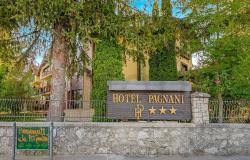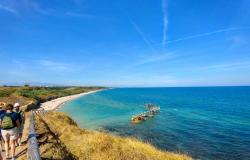 Three specimens of central Italy's endangered bear population have been found poisoned in the country's biggest national park, forest services said Tuesday.
Three specimens of central Italy's endangered bear population have been found poisoned in the country's biggest national park, forest services said Tuesday.
Environment Minister Alfonso Pecoraro Scanio reacted with outrage, saying "we will catch and prosecute these cowardly environmental criminals."
He indicated the case was part of an assault on national parks by farmers and speculators seeking land, and linked the poisonings to this summer's spate of arson attacks on parkland.
Pecoraro Scanio's Green Party called for "harsh prison terms" for the culprits.
The Italian section of the Worldwide Fund for Nature called for a 10,000-euro bounty to be put on the heads of the perpetrators, urging "a new drive against poachers and park despoilers".
It said that two rare wolves and ten rare vultures had also been found poisoned in the last few days. Other endangered species who have fallen victim to poachers include golden eagles and ravens, it said.
"This is unworthy of a civilised country," said WWF Italia chief Fulco Pratesi.
"Allowing a bear or a wolf to be killed is the same as letting artworks to be vandalised - like that madman who took a hammer to Michelangelo's Pieta'".
One of the three bears, 'Bernardo', was an international celebrity, often pictured ambling into inhabited areas where villagers publicly made a fuss of him.
But other villagers were unhappy with incursions by Bernardo and his kin, claiming they were a menace.
Farmers were even less amused by the bears' increasing encroachment, complaining of raided henhouses and uprooted crops.
However, Bernardo was thought to be safe from reprisals because of an international fund set up to compensate farmers.
There are believed to be less than 50 Apennine (or Marsican) brown bears left, protected in the Abruzzo National Park - the country's largest.
The disappearance of high-mountain fodder and smallholdings has been one of the reasons why the bears have begun roaming further downhill, causing friction with humans.
PEOPLE-FRIENDLY BEAR.
Ironically, the Marsican brown bear is one of the most people-friendly in existence.
Bernardo and his mate were found dead Monday and taken to an animal forensics lab in Rome which found traces of a powerful fungicide in their bodies.
A younger male's body was found on Tuesday. He is believed to have eaten poisoned meat.
Bernardo, one of the park's few adult males, was a spearhead in a recently launched drive to bring the Marsican bear back from the brink of extinction.
The Marsican (Ursus arctos marsicanus) is a subspecies of the brown bear.
It lives exclusively in the central Italian Apennine mountains and, according to recent forestry corps's figures, only 45-50 remain in the wild.
Wildlife experts say they want to take that number up to at least 100 "to be sure we don't lose them".
Forest rangers have started boosting the variety of plant species in the forests the bears live in to make sure they have enough food all year around.
This part of the project involves planting 20 different species of fruit tree and bush in the 1,600-square-kilometre area the Marsican bear roams around.
The authorities are also campaigning to raise local people's awareness of the need to respect the bears' environment.
The programme targets hunters too.
The forest guards say Marsicans are often shot by hunters who claim to mistake them for wild boar - even though the bears are much larger.
The Marsican's range is concentrated in Abruzzo, but the bear can also sometimes be seen in parts of Lazio and Umbria.
It is one of the smaller brown bears.
Male specimens usually weigh 95-130 kilos and are 1.8-1.9 metres tall when standing on their hind legs.
The Italian authorities are also carrying out conservation projects to protect the nation's population of European brown bears (Ursus arctos arctos) in Alpine regions of northern Italy.
The Italian government scolded Germany last June when the region of Bavaria allowed hunters to kill Bruno, a brown bear who ambled across the border.
The two-year-old animal, who came from Italy's Trentino region, was shot because Bavarian authorities considered him a danger to humans, especially after he began to prowl around inhabited areas.
Pecoraro Scanio sent a letter to his opposite number in Berlin, Gabriel Sigmar, complaining that Bruno could have been captured, not killed.




